- Home
- Belva Plain
Crescent City Page 2
Crescent City Read online
Page 2
“Is it very far,” David asked, “to New Orleans from that place, Baltimore?”
“Oh, far! Miles and years between the two. Although, to tell you the truth, in my case the years have been surprisingly few. I began on a farm in Maryland. I’d never farmed before, as you know, but when you have your health and a strong will, you can learn to do anything. I learned English fast. I’ve an ear for languages. It wasn’t bad there. They were decent people, a fat man and his fat wife, silent, hardworking folk. They’d sit at meals and there wouldn’t be a sound but chewing and forks clattering. They fed me well, I will say that, yet they were stingy with pay. When the time came for my wages, he only gave me half of what he’d promised. Said he’d had a bad year, which wasn’t true, because the crops were good. We’d had the best weather, enough sun and enough rain, and I’d gone with him to market and seen him sell his corn. It was just that his big fist didn’t want to let the coins go loose. Well, I said to myself, I’d promised to stay two years and he’d promised to pay, but he’d broken his promise, so I had no qualms about breaking mine. I just got up very early one morning and slipped away out of the barn where I slept.”
Fall Fall of the leaves. Such golden, rosy leaves! Sour-sweet apples lay rotted on the grass. Dawn was cold; in a few hours the sun would be hot and the warmed air humming with bee buzz in the apples. By that time I would be far down the road, any road, as long as it was going west.
“This time I had a plan. I’d met a peddler who came by every few months with knickknacks for the farmwives: cotton cloth and thread, needles and toothbrushes. I saw he could do pretty well for himself. So that’s what I did. Got a pack full of stuff with the money the farmer had paid me, and I worked along the road from farm to farm all the way to the Ohio River. And this wasn’t a bad life, either, walking through the country with the coins jingling, growing heavier in your pocket. Or riding the riverboat, turning and curving, wondering what’s around the next curve .…”
After a hundred hills and valleys, remember the debarkation at the spot where the Ohio rode into the Mississippi; the green shimmer of just-beginning spring the smell of grass and all the vast space, the vast silence. Remember how one threw one’s hat off and alone there, unobserved, flung oneself into a crazy dance just for the joy of freedom, of answering to no man, of being young enough to feel one’s own strength and no longer being afraid of anything not having to be afraid of anything anymore.
“After a while I was able to buy a horse. It was such a poor thing, all worn out and sick with saddle sores! I could have afforded a better creature, but I felt sorry for it. So I let it rest awhile and get its strength. We made friends, he and I, and went on together. In and out, back and forth, inland and back to the river. At the wholesalers’ in the towns I replenished my sacks. Sometimes I’d get back onto the riverboat for ten or fifteen miles to the next landing.”
Ferdinand, in the telling, was living it all again, telling as much now to himself as to the others.
“I saw great plantations on the riverfront, grand columned houses, hundreds of black slaves, miles and miles of cotton fields. I saw poor settlements, three or four log houses in the woods. There are no forests like those in Europe, no …” He thought for words. “You can’t imagine the distances, the wildness of those forests. Sometimes it startles you to think how seldom a human foot has been there before you. Often it is hours between settlements. You will see a cluster of men in deerskins, women and children in ragged woolen. You wonder what brought them, what keeps them in this primitive, hard life.”
Forest and swamp and trail Darkness falls under the pines and the thorny underbrush, pressing across the path, whips at your face so that you must protect it with your hand. Your footsteps crackle. Then comes the fright, the old terror out of childhood, everyone’s childhood; something is following at one’s back. In another instant it will spring forward, it will grasp. And you force yourself to steady your mind toward common sense. You will yourself not to turn around and look behind.
“Lonely, empty—”
“And Indians?” David had gone tense with interest. With finger to forehead he twined loose strands of curly hair.
“Oh, yes, Indians! The Choctaw tribes. And wolves. It was because of the wolves, though, not the Indians, that I got a rifle. The Indians never bothered me.”
“A rifle,” the boy repeated. What was left of the child in him was enthralled, Ferdinand saw. Three-quarters man, or maybe more, he was; the rest was the remnant of the child. And with these adventures the father was reaching that child.
He nodded to his son. “Yes, but fortunately, I never had to use it on anything except a rabbit. After a while I was able to afford a wagon for the horse. I remember my first wagonload. Ten trunks, I had, stuffed with every kind of cloth from bombazine to madras. I had brass clocks and gold watches, lisle stockings, paisley shawls, kid gloves, and gimcrack jewelry, everything for master and servant both. Once I had the wagon, I had to stay on traveled roads.” He laughed. “Traveled! Why, you could go a whole day there, too, without meeting another human being! Sometimes I’d come upon another peddler, another European Jew, most likely. After a while I began to feel the loneliness of the life. Still, you know, if you’ve an idea in your head, a thought that goes along with your steps, you’re not entirely alone. I wanted to settle down in one place and open a store, that was my thought. After all, I knew how trading is done; my father bought grain for Napoleon’s army. Well, after two years or so I had saved enough to set up a trading post. Wasn’t much more than a big square shed with shelves all around. But the location was right, on the way to the Chihuahua Trail, supplying caravans on the way to Mexico. Everyone who passed that way, from planters to Indians, came to me. And things moved fast. They moved fast in America.”
The candles were almost burned down. Dinah got up and kindled another. To burn candles so late into the night was still a luxury, an extravagance, Ferdinand knew, as it had always been and as it would always be. Here in these European villages, nothing moved.
“So—where was I? Oh, yes. I prospered, you see, because a community sprang up around me in no time at all. The next year I sold my plot of land for three times what I had paid for it and made my way downriver. What a river! One of the greatest in the world. So wide that in some places you can’t see the opposite shore. With bustling cities all the way: Memphis, the big inland cotton market, Baton Rouge, going south, always south into the heat. New Orleans was what I’d had my eye on from the beginning. The Queen City, or sometimes they call it the Crescent City, at the mouth of the river.”
Ah, New Orleans! The jewel in the river’s crescent, the slow green bayou water, the slumbering afternoons, the glittering nights—
“I fell in love with it as one”—he was about to say, “as one falls in love with a woman,” but a man does not say such things in front of his daughter—“as one would expect to fall in love with such a place. Almost at once I struck up a friendship with a very fine man. His name was Michael Myers. He was a Jew from the northern part of the country near New York. His father had served under George Washington in the American Revolution. Do you know anything about that, David?”
“I’ve heard about it. It was a fight for freedom from England.”
“Exactly. You’ve done some reading, I see. So, now. This Michael Myers had been in New Orleans for twenty years and had built up a thriving import-export business. But he wasn’t young, and he’d been looking for a partner, someone younger and stronger who understood the business or who at least could be taught and trusted. It happened that he found that man in me. He never had any reason to regret his choice, I can say that with confidence. I not only caught on fast, but I was able to add a few touches of my own. For instance, I made friends—I make friends easily—with some of the ship captains you meet in the cafés. And through such contacts alone, I was able to get hold of a profitable line of goods appealing to the ladies—jewelry, shoes, linens, and such. Luxuries, delicacies. I always had
a good eye for delicacies. Yes, my partner never had reason to regret his choice in the short time we were together.”
The grandfather had been paying close attention. “Short time?”
“Yes, unfortunately my partner died of yellow fever a year ago. Most people leave the city in the summer, but for once he didn’t do it, and he caught the fever. Terrible thing.”
“So now you own the business?”
“Yes, he left it to me. His widow and daughter are otherwise provided for with a fine home in Shreveport. I did promise to look out for them if ever I should be needed. The girl, Marie Claire, is a little older than Miriam.”
“Marie Claire,” Dinah remarked. “A strange name for Jewish girl.”
“Well, customs are different in New Orleans.” Yes, different, he reflected, wishing himself back there now and suddenly aware of how far away it was. “My business soon will be one of the largest in the city, if it isn’t already. Last year I finished my house. All brick, built around a courtyard”—his arms swept the air in a large, enthusiastic gesture—“ten times the size of this whole house, with stables and quarters at the rear, built in the square. All the houses are built that way, it’s actually a Mediterranean style.”
“After the Roman atrium,” David said.
“You do keep surprising me, David!”
The old man’s thin voice quivered with scorn. “This boy’s head is full of things that don’t concern a Jew. Roman atrium!”
“Opa.” David spoke patiently. “Opa, you never understand. People aren’t content anymore to live behind closed doors. We want to know what’s been happening in the world outside. That doesn’t mean we must lose our faith.”
Opa rose on his elbow. “Listen to him. Oh, they may not be content, but they’d be better off if they were. I’ve seen enough in my lifetime not to be tricked again. Napoleon came: we were all free. Napoleon left; back inside the wall with us!” The skeletal hands clapped together, making a wall. “Here’s where we are. There’s where they are. And I don’t need to know a thing about what’s happening on their side of the wall because I’m never going to live on their side of the wall. It will never be different. Let a war come or a financial panic, or God knows what, and it’ll be our fault again. It always has been.”
Ferdinand spoke quietly. “With my respect to you, Opa, David is right. If you could only see how we live in America! In my city nobody asks what religion you are, or even whether you have any religion. Anyone who can afford the cost is free to move in the highest social circles.”
“It seems to me,” Dinah remarked, “you were always telling us the same thing about your family in France when Napoleon was emperor.”
“And so I did. There were great days. If he had lasted, things would have been different all over Europe.”
“But he didn’t last,” the old man interrupted. “So it’s just what I’ve been saying. Must I tell you—you of all people—what happened when the Hep Hep boys swept through half the towns in Franconia? Massacre in Darmstadt, in Karlsruhe, in Bayreuth—Hep Hep,” he said bitterly. “I keep forgetting the words it stood for, something about Jerusalem—”
“Hierosolyma perdita est. Jerusalem has been destroyed. That’s Latin.”
“Latin or not, it was blood to us. Hannah’s blood.”
There was a somber silence. Ferdinand lowered his head. The eyes—his son’s, his daughter’s—were unbearable to see. They were Hannah’s eyes, her sweet eyes, which, during these years since he’d lost her, he had almost forgotten.
“Yes,” the old man resumed. The terrible subject had poured a few minutes’ worth of energy into his veins. “Yes, back where we were before! No equal rights of citizenship. No public office. Wear a badge so the German will know who you are when he passes you on the street. Your few pfennigs taxed away. And matrikel resumed—”
Ferdinand was stifled. The weight of all this affliction, which he had for so long been trying to discard, now fell back upon him. And he tried with feeble levity to remove it.
“So you’d have to pay to get married here, David. Think about that!”
“I don’t want to get married.”
“You’ll change your mind in time. A pretty face will change your mind.”
“Smile it away if you can,” the old man said, “but you can’t get away from the truth. All through the horror, did anyone do anything to help us? The clergy, for instance? No. Nobody did anything and nobody ever will.”
“You’re right,” Ferdinand said softly.
“Then what are we arguing about?”
“I don’t know, Opa. I’ve forgotten how this all began.”
“You were saying,” David reminded him, “that it’s different in America.”
“Yes,” said Opa, “and I was saying you will see it will be the same there, too.”
“No,” Ferdinand insisted. “You never will. What do you know about America? Oh, I agree that Europe is finished. Away with it, then, as far as I’m concerned, away with its rotten bigotry and its rotten wars! There’s no future here for the young. Not for our young, at any rate.”
The room closed in. As the night deepened, the space grew smaller, and this very smallness made the world beyond the walls grow larger. They were isolated on an island in a menacing ocean. Suddenly Ferdinand was exhausted. Sorrow and fear exhausted him as he had not thought they could: all the years of his children’s lives that had been wasted! Patiently they sat, the little girl now drooping with sleep, while the boy was poised on the verge of new thoughts.
Suddenly the boy spoke. “I’ve often wished”—he hesitated, glancing at his grandfather, then back at Ferdinand—“I’ve often wished—I should like to be a doctor. It would be impossible for me here.” His outspread palms with their simple gesture described the life of the house.
“Quite possible in America,” Ferdinand said.
The boy—his son!—was pathetic in his outgrown jacket. People always looked pathetic in clothes that didn’t fit.
“The Medical College of Louisiana was founded just last year. You could go there or anywhere. And I’m not forgetting you, Miriam. We have fine schools for young ladies.”
“I’ll come with you,” the child said. “But only if Gretel can come, too.”
“Gretel?” Then Ferdinand understood that she meant the dog. “Of course. She’s a beauty, an aristocrat, isn’t she? A King Charles spaniel. Wherever did you get such a dog?”
“I found her on the road when she was a puppy only a few weeks old, Aunt Dinah said. We think she must have fallen out of someone’s carriage.” The child’s arms tightened around the dog.
“There is an anecdote about them,” Ferdinand remarked. He was fond of anecdotes. “They say that Marie Antoinette had a King Charles spaniel hidden under the folds of her skirt when she went to the guillotine. It may or may not be true, of course.”
The old man was not to be diverted. “So you will take the children away,” he repeated. “Now at the end, you will all leave me.”
This appalling selfishness offended Ferdinand. Opa would actually keep these children here if he could! He would deprive them of their future. In one swift flash Ferdinand saw their future: David a respected doctor, an authority. Miriam married well in a fine house, perhaps even married to a planter owning wide acres. But then, he thought, who knows what I’ll be like when I’m old and sick? So he answered kindly.
“Consider, Opa. Here is a boy, a young man with a long life ahead, and a girl who in a few years will be a woman. What is here for them? New Orleans, even with yellow fever, is better than this.”
“What sort of religious life will they have in that place where you’re taking them?” the old man interrupted.
Ferdinand hesitated. “The truth is, not as much as here.”
“Well, that never bothered you, as I remember. But I hate to think that Hannah’s children will forget what they are.”
“There’s no reason why they should forget, Opa.”
“T
hey have been brought up in this house to observe the laws. Like their mother, they are faithful Jews.”
Ferdinand looked at his children. Much good it had done their mother! He stood up, drawing a gold watch from his pocket.
“I’ve kept you all too late. It’s almost midnight, but I delayed so as not to arrive here before Sabbath sundown.”
“You traveled on the Sabbath all the same,” Dinah said.
“Ah, yes. I’m sorry! I’ve grown careless about things like that. My New Orleans ways again. I shall have to mend them,” he said soothingly.
Long before dawn the two who were to depart from the house rose from bed in their attic rooms, wakeful with excitement, a little fear, and some sadness. From their separate windows they watched the roiling black sky fade to gray, to melancholy lavender, then blaze into a sudden silver over the arc of the emerging sun.
David, leaning on the windowsill, closed his eyes against the spreading light. Papa boasts, he thought. He wants to show how important he is. Did I seem sullen to him? I didn’t know at first what to say. I suppose I’ll admit I’m angry that he went away and left me—left us. Still, that’s not fair: What could he have done with a little boy and a baby? And he was young. When he married my mother he wasn’t many years older than I am now. The queer thing is that he still seems very young, while I feel maybe older than he is—though that’s ridiculous. But I’ve always felt old. It has something to do with a picture that I’ve got in my head. It’s been painted there. Nothing wipes it away, no matter how I force myself to cover it with cheer. I can’t wash it away. Chalk-scrawls on a door: Jude verreck; Jew, die like a beast. Laughter and marching boots. Hep Hep. A woman with a swollen belly arches her back and screams and screams. Yes, yes, that’s how it was: a flurry of skirts, women’s long flying skirts and a door that banged and slammed; behind the door something terrible was happening. Then weeping and the long skirts in a surrounding circle, the women’s faces bending down: poor little boy with no mother, poor little boy.

 The Golden Cup
The Golden Cup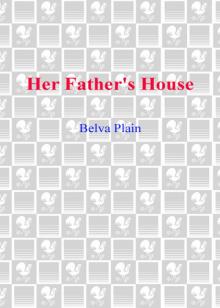 Her Father's House
Her Father's House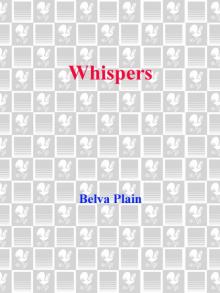 Whispers
Whispers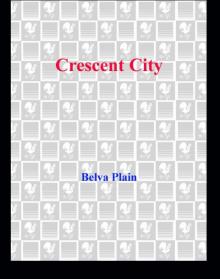 Crescent City
Crescent City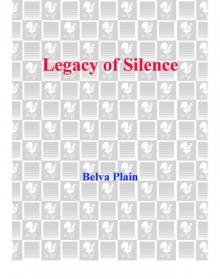 Legacy of Silence
Legacy of Silence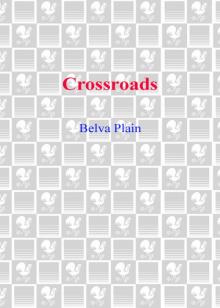 Crossroads
Crossroads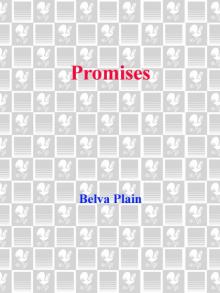 Promises
Promises After the Fire
After the Fire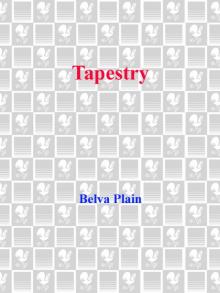 Tapestry
Tapestry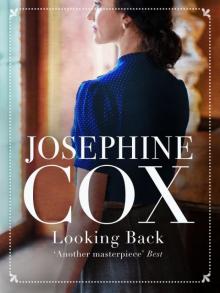 Looking Back
Looking Back Heartwood
Heartwood The Carousel
The Carousel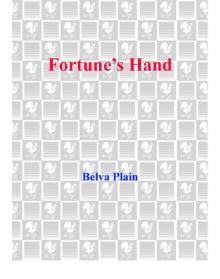 Fortune's Hand
Fortune's Hand Homecoming
Homecoming Random Winds
Random Winds Harvest
Harvest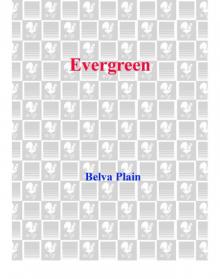 Evergreen
Evergreen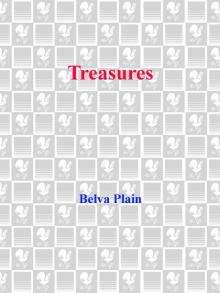 Treasures
Treasures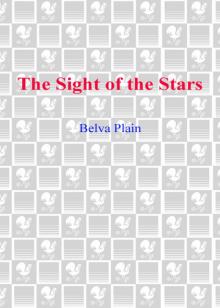 The Sight of the Stars
The Sight of the Stars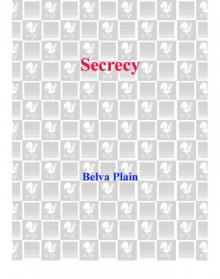 Secrecy
Secrecy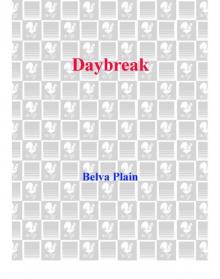 Daybreak
Daybreak Eden Burning
Eden Burning